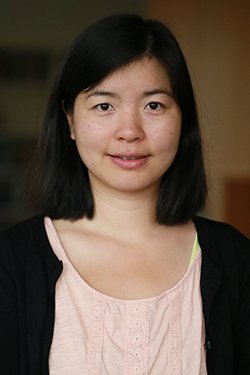Xiaowei Hou
2014 Regional Award Finalist — Post-Doc

Current Position:
Research Associate
Institution:
Memorial Sloan Kettering Cancer Center
Discipline:
Biochemistry & Structural Biology

Current Position:
Research Associate
Institution:
Memorial Sloan Kettering Cancer Center
Discipline:
Biochemistry & Structural Biology
Recognized for: Pioneering work in the structural elucidation of the calcium release-activated channel (CRAC) Orai
Areas of Research Interest and Expertise: Structural Biology of Membrane Proteins, Membrane Protein-Protein Interaction, Calcium Signaling, Calcium Channels, Ion Channel Assays and Imaging
Biography:
PhD, University of Science and Technology of China/Chinese Academy of Science
BS, Anhui University
Xiaowei Hou studies the structure and structure-function relationship of the calcium release-activated calcium (CRAC) channel. The CRAC channel conducts calcium ions across the plasma membrane in response to calcium depletion in the endoplasmic reticulum (ER), which is critical for T lymphocyte activation during immune responses. The channel’s function requires two components: the plasma membrane calcium channel Orai and its regulator, the ER calcium sensor STIM. Hou determined the 3D crystal structure of the calcium channel Orai to 3.35 Å resolution. The structure reveals novel features of the channel and provides insights into the principles of selective calcium permeation and gating.
Hou’s later research has focused on the crosstalk between Orai and STIM using combined techniques of molecular biology, biochemistry, biophysics and structural biology. Hou recently solved new Orai structures in a different conformation, indicating its structural flexibility prior to STIM binding. She has developed ion flux assays by which she achieved reconstitution of CRAC channel function in liposomes using purified Orai and STIM. These findings further elucidate the channel’s function and gating by STIM. The flux assays provide fast and direct approaches to study CRAC channel function, which will benefit the structure-function investigation and therapeutic development targeted to CRAC channel-associated diseases.
“Being able to visualize the 3D structure of a calcium channel is an amazing start. It has opened my eyes to a new world, vast and full of wonders, in which I am extremely excited to exploit.”
Key Publications:
Other Honors:
2002 Grade 4 (highest level) of the National Computer Rank Examination in China
2014 MSKCC Postdoctoral Researcher Award